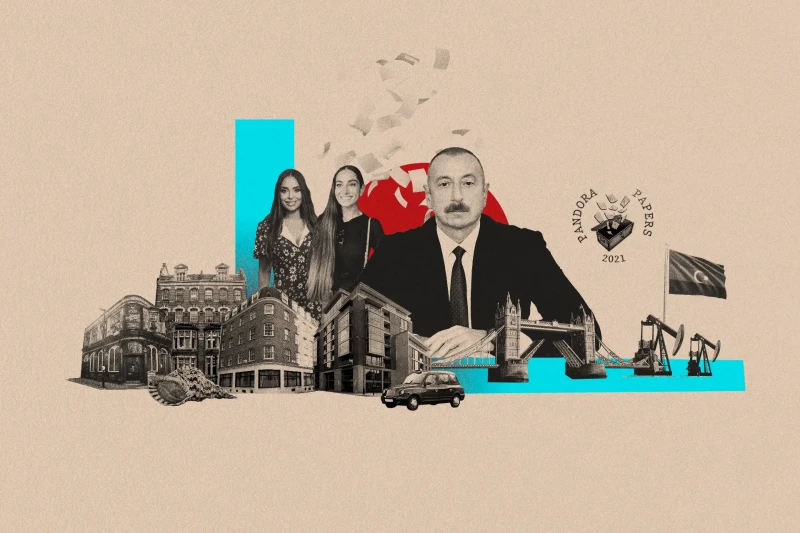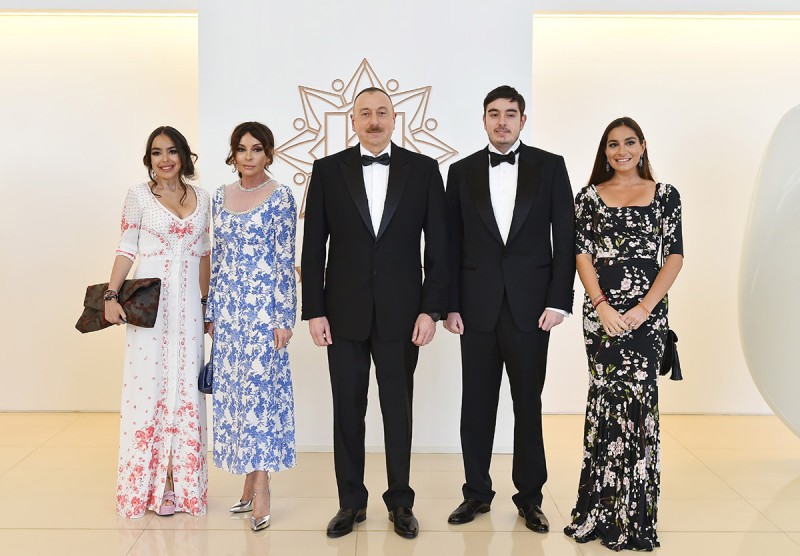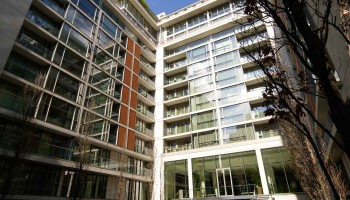For centuries, London has been one of the world’s top destinations for shopping, dining, and good living. And a development boom over the last few decades has only expanded the range of attractions.
Visitors and locals alike have enjoyed cutting-edge “molecular gastronomy” at the Hibiscus restaurant, shopped on charming Sicilian Avenue, or stopped for a Guinness at the gothic-style, 19th-century Bloomsbury Tavern.
Residential developments with names like “The Knightsbridge” and “Thornwood Gardens” have sprung up just steps from Harrods department store and world-famous Hyde Park. When these developments are sold, the tens of millions of pounds that change hands sometimes make national news.
But these impressive buildings in the British capital have one thing in common that no admiring passerby — or even a savvy local real-estate reporter — would ever know: They are or have been owned by some of the people closest to Azerbaijan’s dictatorial president Ilham Aliyev.
Aliyev’s two daughters, his son, his father-in-law, and two of the family’s close business associates have held, at their peak, a staggering £429 million ($694 million) in London real estate — including prominent historical buildings, commercial developments, and luxury apartments in prestigious neighborhoods.
Their ownership of this property empire has been systematically hidden for years behind offshore companies with generic names like Sheldrake Six and Fliptag Investments.
But thanks to the Pandora Papers, a new leak of offshore documents obtained by the International Consortium of Investigative Journalists and shared with OCCRP and other media outlets, reporters have been able to pierce the veil of secrecy that surrounds these companies.
In total, OCCRP found 84 previously unknown offshore companies, registered in the British Virgin Islands, that the Aliyevs and their associates have owned since 2006.
The companies appear to be managed as a closely knit system: Again and again, the leaked records show, groups of them filed paperwork or changed directors on the very same day. Their owners and directorships were also frequently shuffled among the same small group of people.
A number of the companies were incorporated during the first term of Ilham Aliyev’s presidency, which began in 2003. He is now well into his fourth term, the head of an increasingly autocratic regime built on the jailing of journalists, lawyers, and activists, fraudulent elections, and massive corruption.
His son, Heydar, acquired his first offshore company while he was still in grade school. His daughter Arzu, who studied psychology in London, had just turned 19 when she acquired her own.
Though the companies did not declare what they were doing beyond vague statements like “opening an account” or “trading in Azerbaijan and Europe,” one purpose is clear: Many of them held vast amounts of property across the British capital and beyond.
The source of the money used to buy much of this real estate is hidden in paperwork that may never become public. Those funds may or may not be legitimate, and the individuals involved may have little or no knowledge of their origins.
Reporters did find that at least eight of their companies received multi-million-dollar infusions of cash from vast money laundering and transfer systems previously uncovered by OCCRP, including the Azerbaijani, Russian, and Troika Laundromats. The ultimate origins of this money are also unknown; these systems are known to have moved both legitimate and illegitimate funds.
While some of these offshore companies have been closed in recent years, and some of the properties they owned have been sold, as of 2017 the Aliyevs had transferred £125 million ($191 million) in real estate into a secretive trust that was established and controlled by the president’s father-in-law.
One of these properties was sold in 2018, but the Pandora Papers records concerning this set of companies ends that year, and no further information is available.
The administration of president Ilham Aliyev did not respond to requests for comment for this story. Neither did his children Leyla, Arzu, or Heydar Aliyev.
“Enhanced and Ongoing Scrutiny”?
The Aliyev family’s rule over Azerbaijan began with Ilham’s father Heydar Aliyev, a longtime Soviet official who took control of the country two years after it gained its independence in 1991.
The elder Aliyev was an authoritarian leader, and under his watch Azerbaijan began developing into a corrupt petro-state. But those familiar with the country remember his regime as different than that of his son.
“Heydar Aliyev maintained very tight control of corruption,” said Richard Kauzlarich, the U.S. ambassador to Azerbaijan between 1994 and 1997. “He certainly wasn't blatant about it in the way Ilham and his wife Mehriban and their respective families are today.”
“I mean, they're basically all in it for themselves.”
It didn’t take long for this to change after Ilham ascended to the presidency in 2003. Within a few years, his younger daughter Arzu, just 19 years old, was already the shareholder of Strahan Holding and Finance, an offshore company with a Swiss bank account that acquired three apartments worth £5.1 million ($9.7 million) in the London district of Knightsbridge.
The daughter of a president should immediately have drawn increased scrutiny and attention at Trident Trust, the offshore service provider that set up the company for her.
But it was not until three years later, in 2009, that Trident Trust appears to have commissioned a London-based due diligence firm to look into her background. A report by the firm that appears in the leaked data explains why any money connected to the young woman should be treated as potentially suspicious.
“We draw our client’s attention to the widespread and sustained allegations of corruption against the subject’s father, Ilham Aliyev, and the apparent widely held opinion that any funds held by President Aliyev and his family have been accumulated as a direct result of his position as president of Azerbaijan.”
The report went on to say that, “should the client wish to establish a relationship with Arzu Aliyeva … any transaction involving her should be subject to enhanced and ongoing scrutiny and verification.”
By that point, the relationship had long been established: Trident Trust had already incorporated at least 16 offshore companies for Arzu Aliyeva. In addition to the three apartments in London’s Knightsbridge, these firms had already acquired a penthouse in the same building and a large commercial property in Romania.
If the report gave Trident Trust any pause about continuing to work with the Aliyev family, the services provider didn’t show it. Starting that year, it also took on as clients Arzu’s older sister Leyla and her 11-year-old brother Heydar: Leyla became the owner of her own Trident-administered company which held a large office building near London’s world-famous Regent Street, while young Heydar became the “landlord” of a Michelin-starred restaurant, an art gallery, and the head office of Conde Nast.
In a response to reporters’ inquiries, a representative of Trident Trust wrote that “each of Trident’s trust and corporate services businesses is regulated in the jurisdiction in which it operates and is fully committed to compliance with all applicable regulations. Trident routinely cooperates with any competent authority which requests information.”
“Trident does not discuss its clients with the media,” she added.
By 2010, OCCRP and other media outlets were already uncovering the Aliyev children’s wealth. These stories of offshore company empires, natural resource extraction, and telecommunications were a striking contrast to their apparent careers in the arts and media.
Long Time Beneficiaries
Arzu studied psychology in London and has produced several documentaries. She is now the president of a Baku media production company, though little else is known about her life.
Her older sister Leyla married a Russian pop singer and spent several years living in Moscow, where she founded a glossy culture magazine. She was also reportedly a movie producer, dabbled in art, served as vice president of a charitable foundation, and even wrote an ode to her late grandfather that ended up in a textbook for elementary school children.
Least of all is known about Heydar, his father’s likely successor. He graduated from the Azerbaijan Diplomatic Academy, which is headed by his mother’s uncle, in 2018.
If the Aliyev children’s massive fortune comes from their father, it remains difficult to explain in terms of legitimate income. Before becoming president, Ilham Aliyev was the vice-president of SOCAR, Azerbaijan’s state oil company. His current earnings as president are not known, but his last published official salary, in 2015, was about $230,000 a year.
The Partners
Given the Aliyev children’s young age and lack of evident business experience, as well as their father’s official income, the question naturally arises of where their vast sums of money came from.
Neither Aliyev nor his wife, Mehriban, have ever declared their net worth, and Azerbaijani law does not require them to do so, although a few presidential candidates have volunteered such information.
In search of explanations for their wealth, journalists have spent years investigating the connections between the Aliyev family and the oligarchs that have grown wealthy in Azerbaijan under Ilham’s rule.
Two key figures, both former tax ministry officials, have emerged: Fazil Mammadov and Ashraf Kamilov are tied to Azerbaijan’s first family through a business conglomerate called AtaHolding, which was worth hundreds of millions of dollars and included banking, construction, insurance, and other interests.
As part of the Panama Papers investigation, OCCRP showed that the business, which Mammadov founded and which Kamilov would go on to lead, was created months before the election that cemented Aliyev’s rule. It also showed how Mammadov invited the Aliyev family to join him in the company, creating the foundation of a powerful business and political partnership.
A Draft Plan For A Secretive Foundation
The profits from the AtaHolding structure were likely meant to flow into a secretive Panamanian foundation Mammadov established with the help of Mossack Fonseca, the offshore services firm that became infamous after its doings were revealed in the Panama Papers.
So, while the exact sources of the Aliyev family’s fortune are unknown, it is clear that their financial success is intertwined with that of AtaHolding and its creators.
But the new Pandora Papers documents show that Kamilov was more closely entwined with the Aliyev family’s offshore empire than anyone had ever realized.
He appears in 35 of the 84 offshore companies investigated in this story, including 10 in which he and members of the family both appear as shareholders. In three cases, it was Kamilov who acquired a BVI company, amassed valuable real estate, and then transferred it to the Aliyev family.
Another important figure in these structures was Gafar Gurbanov, a former tax ministry official who had also served as AtaHolding’s chairman. He served as director of most of the 84 intertwined offshore companies. (As his profile grew in the business world, he was replaced in these structures by his brother Adnan and then by Mammadov’s nephew.)
Much of the companies’ activities is unknown, but documents from their administrator, Trident Trust, show that some were established to hold bank accounts in Switzerland and in the Czech Republic. Others were declared as investment vehicles or trading businesses. A few owned functioning businesses in Azerbaijan.
What is known is that some of them held valuable assets: dozens of properties in all, almost entirely in London, worth £429 million ($694 million) at their peak. Land records show that most were purchased in cash.
In one of the most curious cases, Heydar owned four buildings on Maddox street in the tony district of Mayfair when he was just 11 years old.
The most expensive property owned by a member of the Aliyev family was a commercial development on Conduit Street, acquired for £35.5 million ($58.8 million) by Kamilov and transferred to Arzu Aliyeva, then 22 years old, several weeks later.
The largest asset in the company network was a £208-million ($343-million) commercial development called Holborn Links, which spans several blocks in the heart of London. It included a historic pub called Bloomsbury Tavern just steps from the British Museum. Before being sold in 2016, the development was held by a company owned by Kamilov.
Laundromat Payments
In most cases, the leaked Pandora Papers documents contained no information about how money entered the offshore empire of the Aliyevs and their associates.
But in 2013, the company that later bought Holborn Links, Perez International, received more than $1.2 million from Westburn Enterprises, one of three main shell companies at the heart of the Russian Laundromat, a $20-billion money laundering and transfer system.
Three other Kamilov companies also received money from Westburn, making for $16.6 million in Russian Laundromat transactions.
A second core company from the Russian Laundromat sent $6.1 million to Quandu Finance, which bought a £29-million ($47 million) townhouse that was transferred to Ilham Aliyev’s father-in-law.
And another BVI company, co-owned by Gurbanov, received nearly $800,000 from a shell company whose account was set up by the Lithuanian Ukio Bank as part of the Azerbaijani Laundromat, a separate money laundering scheme uncovered by OCCRP in 2019.
As is typical with such “laundromats,” the payments were described as being for “equipment” or “building equipment,” despite it being extremely unlikely that these shell companies were actually buying or selling any physical items.
The Zarrab Connection
Transactions involving two other companies in the Aliyev associates’ network also raise questions.
Neither Gurbanov nor Kamilov responded to questions about the real purpose of their transactions.
Into the Family Trust
After years of steady wealth accumulation, things appear to have reached a peak around 2015. That year marked the beginning of a financial crisis for Azerbaijan, with drops in oil prices and massive devaluation of the currency. Ordinary Azeris suffered the most, but even the country’s elite found themselves competing over a shrinking pie. AtaBank, a key part of AtaHolding, went bankrupt years later.
The offshore empire of the Aliyevs and their associates also appears to have been affected. Many of their companies went into disuse, apparently no longer needed.
They also sold off three of their commercial investments, including the massive Holborn Links development.
But they didn’t sell everything, or even close to it. Kamilov and Gurbanov kept a significant part of their holdings. And the Aliyevs transferred $191 million in properties, including the elite Knightsbridge apartment where the Aliyev daughters appeared to live, into a secretive family trust administered from the Isle of Man.
Apparently to disguise their trail, the companies that owned these properties were first acquired by Ilham Aliyev’s elderly father-in-law, Arif Pashayev, now 87. He then transferred them into another company whose sole purpose was to acquire them and then to move them onward into the trust. Pashayev did not respond to requests for comment.
These maneuvers made it look like the properties had been transferred away. If not for one document found by reporters in the Pandora Papers, they would have been lost from public view as they disappeared into the trust, which is protected by the Isle of Man’s strict corporate secrecy laws. However, Pashayev filed a declaration form with Trident Trust when he moved the properties, estimating the value of the trust’s assets at £100 million and indicating that he was the source of the funds.
That’s where the trail of the properties is lost.
In one of the last documents in the Pandora Papers known to pertain to the Aliyevs and their associates, Trident Trust requests more information about Arzu Aliyeva from her representatives:
“During our normal ongoing world check screening, a hit was indicated for the beneficial owner of the above companies as a [Politically Exposed Person],” the November 2018 email reads. “The beneficial owner is the daughter of the President of the Azerbaijan national government.”
“We will require the following documents in order to satisfy our requirement for enhanced due diligence: bank reference letter, professional reference letter, CV.”
Aliyeva’s representatives replied on the same day, attaching an old reference letter from Aliyeva’s bank in Azerbaijan. “Ms. Arzu Aliyeva is well known to us for more than 10 years,” it read. “We consider the above-mentioned person trustworthy and we believe that she would not take any commitment she would not be able to fulfill.”
Alexandra Li (OCCRP/Kloop) contributed reporting.

.jpg/daf5f209c20846c8dcd2295cae2a00ae/kenyan-aladdin-sep24-(1).jpg)











